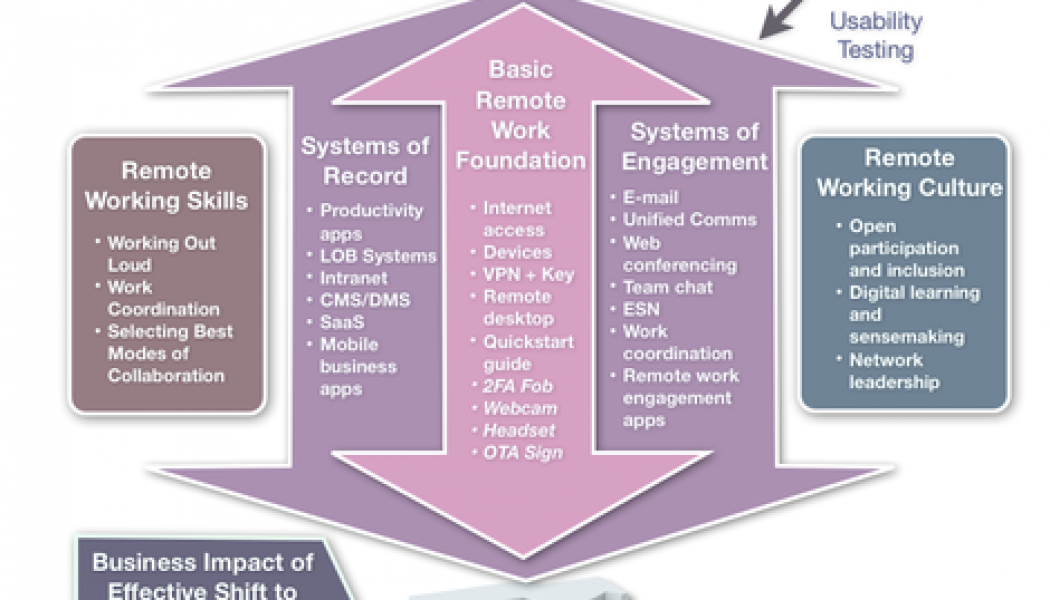Cloud Computing
Is Company Culture Hindering Your Mobile Workforce?
Sourced from Tapscape While the mobile workforce has long been possible in theory, thanks to the ready availability of cloud technologies, many enterprises have continued to operate in a more traditional manner. The COVID-19 pandemic and subsequent lockdowns around the globe have forced businesses to completely rethink the way they operate. This unprecedented situation has dramatically accelerated the mobility drive, and subsequently the adoption of the cloud. Most organisations were faced with the choice of enabling staff to work from home or ceasing to operate, and the cloud offers the ideal way to access technologies to facilitate this. There is no going back “While we may have moved down a level in our lockdown status, President Ramaphosa has stressed that those who are able to work re...
Cloud Tech Helps With The Transition into a New Normal
Sourced from PC Mag With companies needing to support remote working strategies and with a rise in demand for cloud-based business continuity tools and services during the COVID-19 pandemic, it is expected that the global cloud market size will grow from $233 billion in 2019 to reach $295 billion by 2021. The importance of the cloud can no longer be debated. Instead, the focus shifts to optimally integrating it into the business strategy to ensure business sustainability. The research suggests that companies are using cloud automation and increasing their online presence by developing e-commerce websites on cloud platforms to decrease the impact of COVID-19 on productivity and operational efficiency. Cloud-driven market /* custom css */ .tdi_3_eee.td-a-rec-img{ text-align: left; }.tdi_3_ee...
Investment in Digital Transformation is Expected to Reach $7.4 trillion by 2023, says Report
As organizations look to transform their business operations and revolutionize customer service, Digital Transformation (DX) is at the top of most CXOs’ agendas; in fact, DX spending is expected to approach $7.4 trillion between 2020 and 2023, a CAGR of 17.5%. However, according to the latest industry data released today from Veeam Software, almost half of global organizations are being hindered in their DX journeys due to unreliable, legacy technologies with 44% citing lack of IT skills or expertise as another barrier to success. Moreover, almost every company admitted to experiencing downtime, with 1 out of every 10 servers having unexpected outages each year — problems that last for hours and cost hundreds of thousands of dollars – and this points to an urgent need to moderniz...
How Using Cloud Can Increase Security for Remote Working During the Pandemic
Sourced from Tapscape The cloud can enable organisations to quickly scale out enhanced security to a suddenly remote workforce, as part of efforts to ensure business continuity and disaster recovery – this is according to Patrick Grillo, Senior Director and Solutions Marketing at Fortinet. The pandemic had created unique challenges for employers and employees across all sectors around the world, with Varun Kukreja, Senior Program Manager – IT Security MEA, IDC Middle East, Africa, & Turkey, saying securing the teleworker had become a top priority, with some 90% of organisations looking to provide staff with secure access to IT services and applications. The pandemic had also accelerated digital transformation, he says, with an IDC Meta survey interim results revealing that some 56% of ...
CIOs Should Embrace the Opportunities of a Post-lockdown Market
As South Africa enters the tenth week of the nationwide lockdown, the business focus has shifted from enabling employees to work remotely to now planning for what the new normal is likely to look like. This requires CIOs to balance existing organisational priorities with ways of becoming more adaptive to the changing environment. Critical to this is decisive decision-making that positions the business for growth. For small to medium-sized businesses that do not have all the skills in-house to transform their IT environments, decision-makers should consider going the outsourcing route. By partnering with a managed service provider (MSP) that can deliver everything from a cloud-readiness audit through to helping identify the technology gaps that exist between the business strategy and what i...
Vodacom Welcomes Launch of AWS Data Centres in South Africa
Image sourced from Blog dbi services Amazon Web Services (AWS) – alongside launching its next wave of data centres in South Africa – has partnered with Vodacom to grow the South African mobile networks offering further and deliver improved business, cloud and other solutions to its clients. “Vodacom is an AWS Advanced Consulting Partner with operations across the African continent, so naturally we are very pleased that they have made the decision to invest in the South African market, as well as the broader African market, by opening these data centres in Cape Town,” says Shameel Joosub, Vodacom Group CEO. “The most exciting aspect of this is the integration of AWS into the Vodacom Network, which will allow our clients to take advantage of the benefits of both offerings, and use them to tr...
AWS Partners with Vodacom to Improve Business and Cloud Solutions
Image sourced from Blog dbi services Amazon Web Services (AWS) – alongside launching its next wave of data centres in South Africa – has partnered with Vodacom to grow the South African mobile networks offering further and deliver improved business and cloud solutions. “Vodacom is an AWS Advanced Consulting Partner with operations across the African continent, so naturally we are very pleased that they have made the decision to invest in the South African market, as well as the broader African market, by opening these data centres in Cape Town,” says Shameel Joosub, Vodacom Group CEO. “The most exciting aspect of this is the integration of AWS into the Vodacom Network, which will allow our clients to take advantage of the benefits of both offerings, and use them to transform their bu...













